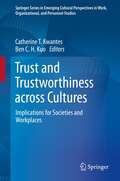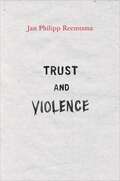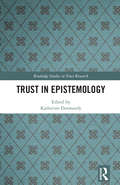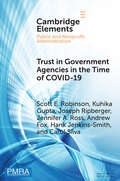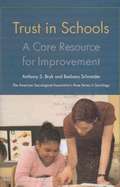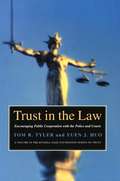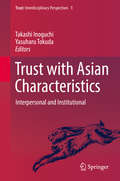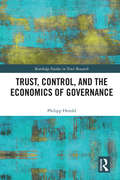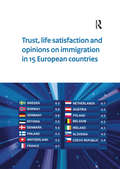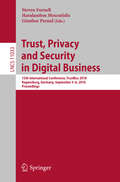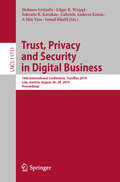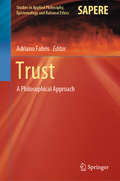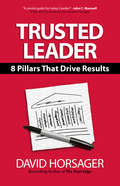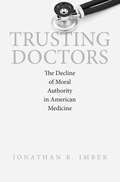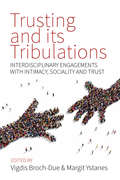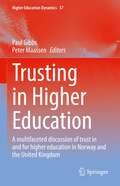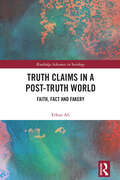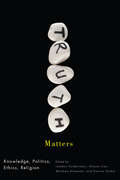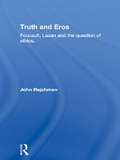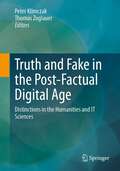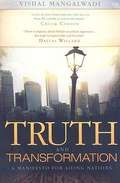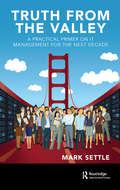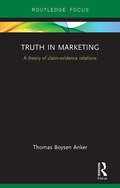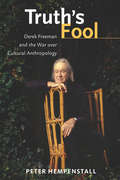- Table View
- List View
Trust and Trustworthiness across Cultures: Implications for Societies and Workplaces (Springer Series in Emerging Cultural Perspectives in Work, Organizational, and Personnel Studies)
by Catherine T. Kwantes Ben C. H. KuoThis book investigates trust in seven different cultural contexts, exploring how societal culture can influence our expectations regarding what may be considered trustworthy within a cultural context. Although the definition of trustworthiness is clear, how it is operationalized and applied in various cultural contexts can vary greatly. While certain components of trustworthiness may be universal, what a given society expects from individuals, and the extent to which they fulfill those expectations, plays a role in whether or not those individuals may be trusted. Each chapter discusses literature related to trust and trustworthiness within a specific cultural context, addresses both etic and emic aspects of decisions to trust another, and provides practical implications, with a focus on how trustworthiness can be seen in organizational contexts. With contributions from international scholars and a diverse range of cross-cultural perspectives, this unique volume will be of interest to work psychologists, HR and management professionals, and researchers in organizational behavior.
Trust and Violence: An Essay on a Modern Relationship
by Jan Philipp ReemtsmaA philosophical investigation into the connections between trust and violenceThe limiting of violence through state powers is one of the central projects of the modern age. Why then have recent centuries been so bloody? In Trust and Violence, acclaimed German intellectual and public figure Jan Philipp Reemtsma demonstrates that the aim of decreasing and deterring violence has gone hand in hand with the misleading idea that violence is abnormal and beyond comprehension. We would be far better off, Reemtsma argues, if we acknowledged the disturbing fact that violence is normal. At the same time, Reemtsma contends that violence cannot be fully understood without delving into the concept of trust. Not in violence, but in trust, rests the foundation of true power.Reemtsma makes his case with a wide-ranging history of ideas about violence, from ancient philosophy through Shakespeare and Schiller to Michel Foucault, and by considering specific cases of extreme violence from medieval torture to the Holocaust and beyond. In the midst of this gloomy account of human tendencies, Reemtsma shrewdly observes that even dictators have to sleep at night and cannot rely on violence alone to ensure their safety. These authoritarian leaders must trust others while, by means other than violence, they must convince others to trust them. The history of violence is therefore a history of the peculiar relationship between violence and trust, and a recognition of trust's crucial place in humanity.A broad and insightful book that touches on philosophy, sociology, and political theory, Trust and Violence sheds new, and at times disquieting, light on two integral aspects of our society.
Trust in Epistemology (Routledge Studies in Trust Research)
by Katherine DormandyTrust is fundamental to epistemology. It features as theoretical bedrock in a broad cross-section of areas including social epistemology, the epistemology of self-trust, feminist epistemology, and the philosophy of science. Yet epistemology has seen little systematic conversation with the rich literature on trust itself. This volume aims to promote and shape this conversation. It encourages epistemologists of all stripes to dig deeper into the fundamental epistemic roles played by trust, and it encourages philosophers of trust to explore the epistemological upshots and applications of their theories. The contributors explore such issues as the risks and necessity of trusting others for information, the value of doing so as opposed to relying on oneself, the mechanisms underlying trust’s strange ability to deliver knowledge, whether depending on others for information is compatible with epistemic responsibility, whether self-trust is an intellectual virtue, and the intimate relationship between epistemic trust and social power. This volume, in Routledge’s new series on trust research, will be a vital resource to academics and students not just of epistemology and trust, but also of moral psychology, political philosophy, the philosophy of science, and feminist philosophy – and to anyone else wanting to understand our vital yet vulnerable-making capacity to trust others and ourselves for information in a complex world.
Trust in Government Agencies in the Time of COVID-19 (Elements in Public and Nonprofit Administration)
by Andrew Fox Hank Jenkins-Smith Scott E. Robinson Kuhika Gupta Joseph Ripberger Jennifer A. Ross Carol SilvaAs the US faced its lowest levels of reported trust in government, the COVID-19 crisis revealed the essential service that various federal agencies provide as sources of information. This Element explores variations in trust across various levels of government and government agencies based on a nationally-representative survey conducted in March of 2020. First, it examines trust in agencies including the Department of Health and Human Services, state health departments, and local health care providers. This includes variation across key characteristics including party identification, age, and race. Second, the Element explores the evolution of trust in health-related organizations throughout 2020 as the pandemic continued. The Element concludes with a discussion of the implications for agency-specific assessments of trust and their importance as we address historically low levels of trust in government. This title is also available as Open Access on Cambridge Core.
Trust in Schools: A Core Resource for Improvement
by Barbara Schneider Anthony BrykMost Americans agree on the necessity of education reform, but there is little consensus about how this goal might be achieved. The rhetoric of standards and vouchers has occupied center stage, polarizing public opinion and affording little room for reflection on the intangible conditions that make for good schools. Trust in Schools engages this debate with a compelling examination of the importance of social relationships in the successful implementation of school reform. Over the course of three years, Bryk and Schneider, together with a diverse team of other researchers and school practitioners, studied reform in twelve Chicago elementary schools. Each school was undergoing extensive reorganization in response to the Chicago School Reform Act of 1988, which called for greater involvement of parents and local community leaders in their neighborhood schools. Drawing on years longitudinal survey and achievement data, as well as in-depth interviews with principals, teachers, parents, and local community leaders, the authors develop a thorough account of how effective social relationships—which they term relational trust—can serve as a prime resource for school improvement. Using case studies of the network of relationships that make up the school community, Bryk and Schneider examine how the myriad social exchanges that make up daily life in a school community generate, or fail to generate, a successful educational environment. The personal dynamics among teachers, students, and their parents, for example, influence whether students regularly attend school and sustain their efforts in the difficult task of learning. In schools characterized by high relational trust, educators were more likely to experiment with new practices and work together with parents to advance improvements. As a result, these schools were also more likely to demonstrate marked gains in student learning. In contrast, schools with weak trust relations saw virtually no improvement in their reading or mathematics scores. Trust in Schools demonstrates convincingly that the quality of social relationships operating in and around schools is central to their functioning, and strongly predicts positive student outcomes. This book offer insights into how trust can be built and sustained in school communities, and identifies some features of public school systems that can impede such development. Bryk and Schneider show how a broad base of trust across a school community can provide a critical resource as education professional and parents embark on major school reforms. A Volume in the American Sociological Association's Rose Series in Sociology
Trust in the Law: Encouraging Public Cooperation with the Police and Courts Through
by Tom R. Tyler Yuen HuoPublic opinion polls suggest that American's trust in the police and courts is declining. The same polls also reveal a disturbing racial divide, with minorities expressing greater levels of distrust than whites. Practices such as racial profiling, zero-tolerance and three-strikes laws, the use of excessive force, and harsh punishments for minor drug crimes all contribute to perceptions of injustice. In Trust in the Law, psychologists Tom R. Tyler and Yuen J. Huo present a compelling argument that effective law enforcement requires the active engagement and participation of the communities it serves, and argue for a cooperative approach to law enforcement that appeals to people's sense of fair play, even if the outcomes are not always those with which they agree. Based on a wide-ranging survey of citizens who had recent contact with the police or courts in Oakland and Los Angeles, Trust in the Law examines the sources of people's favorable and unfavorable reactions to their encounters with legal authorities. Tyler and Huo address the issue from a variety of angles: the psychology of decision acceptance, the importance of individual personal experiences, and the role of ethnic group identification. They find that people react primarily to whether or not they are treated with dignity and respect, and the degree to which they feel they have been treated fairly helps to shape their acceptance of the legal process. Their findings show significantly less willingness on the part of minority group members who feel they have been treated unfairly to trust the motives to subsequent legal decisions of law enforcement authorities. Since most people in the study generalize from their personal experiences with individual police officers and judges, Tyler and Huo suggest that gaining maximum cooperation and consent of the public depends upon fair and transparent decision-making and treatment on the part of law enforcement officers. Tyler and Huo conclude that the best way to encourage compliance with the law is for legal authorities to implement programs that foster a sense of personal involvement and responsibility. For example, community policing programs, in which the local population is actively engaged in monitoring its own neighborhood, have been shown to be an effective tool in improving police-community relationships. Cooperation between legal authorities and community members is a much discussed but often elusive goal. Trust in the Law shows that legal authorities can behave in ways that encourage the voluntary acceptance of their directives, while also building trust and confidence in the overall legitimacy of the police and courts. A Volume in the Russell Sage Foundation Series on Trust
Trust with Asian Characteristics
by Takashi Inoguchi Yasuharu TokudaThis volume, edited by a political scientist and a practicing medical doctor, is organized into two parts: interpersonal and institutional trust. To gauge trust both interpersonal and institutional in 29 Asian societies, the AsiaBarometer survey, the best--and only--available such data source in the world was used. The survey, focusing on the quality of life in Asia, was carried out in the 2000s in 29 Asian societies (in East, Southeast, South, and Central Asia), and in the United States, Australia, and Russia for comparative analysis. Trust is a key intermediate variable linking an individual and a broader society. Yet systematically and scientifically assembled data have tended to be narrowly focused on Western societies. In the 2000s non-Western data on the quality of life have steadily increased. The AsiaBarometer survey, however, is the instrument that best examines the quality of life in a large number of Asian societies with nationwide random sampling and face-to-face interviewing, with the number of samples ranging from 1,000 to 3,000. In gauging interpersonal trust, the question, "Generally, do you think people can be trusted, or do you think that you can't be too careful in dealing with people (i. e. , that it pays to be wary of people)?" is asked along with additional questions. In measuring institutional trust, the question is asked: "How much confidence do you place in the following institutions?" (Listed are the central government, the courts, the military, the police, political parties, the parliament, mass media, business companies, medical hospitals, and other institutions. ) In examining interpersonal and institutional trust Asia-wide, special attention is paid to historical and geo-cultural backgrounds of the societies being surveyed. Examination of the link between trust of mass media and individual health and between trust in medical care and individual health focuses on Japan. Among the 12 chapters, 9 are reprints of journal articles published in the 2000s, and the introduction and 2 other chapters were written especially for this book to reflect the latest progress in the field. This work provides a rich source to be consulted by a wide range of readers interested in comparative politics, quality of life, and Asia in general.
Trust, Computing, and Society
by Richard H.R. HarperThe internet has altered how people engage with each other in myriad ways, including offering opportunities for people to act distrustfully. This fascinating set of essays explores the question of trust in computing from technical, socio-philosophical, and design perspectives. Why has the identity of the human user been taken for granted in the design of the internet? What difficulties ensue when it is understood that security systems can never be perfect? What role does trust have in society in general? How is trust to be understood when trying to describe activities as part of a user requirement program? What questions of trust arise in a time when data analytics are meant to offer new insights into user behavior and when users are confronted with different sorts of digital entities? These questions and their answers are of paramount interest to computer scientists, sociologists, philosophers and designers confronting the problem of trust.
Trust, Control, and the Economics of Governance (Routledge Studies in Trust Research)
by Philipp HeroldIn today’s world, we cooperate across legal and cultural systems in order to create value. However, this increases volatility, uncertainty, complexity, and ambiguity as challenges for societies, politics, and business. This has made governance a scarce resource. It thus is inevitable that we understand the means of governance available to us and are able to economize on them. Trends like the increasing role of product labels and a certification industry as well as political movements towards nationalism and conservatism may be seen as reaction to disappointments from excessive cooperation. To avoid failures of cooperation, governance is important – control through e.g. contracts is limited and in governance economics trust is widely advertised without much guidance on its preconditions or limits. This book draws on the rich insight from research on trust and control, and accommodates the key results for governance considerations in an institutional economics framework. It provides a view on the limits of cooperation from the required degree of governance, which can be achieved through extrinsic motivation or building on intrinsic motivation. Trust Control Economics thus inform a more realistic expectation about the net value added from cooperation by providing a balanced view including the cost of governance. It then becomes clear how complex cooperation is about ‘governance accretion’ where limited trustworthiness is substituted by control and these control instances need to be governed in turn. Trust, Control, and the Economics of Governance is a highly necessary development of institutional economics to reflect progress made in trust research and is a relevant addition for practitioners to better understand the role of trust in the governance of contemporary cooperation-structures. It will be of interest to researchers, academics, and students in the fields of economics and business management, institutional economics, and business ethics. Note that this work is the first of its kind that explicitly reflects on the societal realities, how these drive the assumption setting process, and how these assumptions influence the theory outcome.
Trust, Life Satisfaction and Opinions on Immigration in 15 European Countries (Netherlands Institute For Social Research Ser.)
by Jeroen Boelhouwer, Gerbert Kraaykamp and lneke StoopEurope is in flux. The economiccrisis, large migration flows, andterrorist attacks have put pressureon international solidarity and attitudestowards civil liberties suchas freedom of movement. To whatextent do European countries favorimmigration and receiving refugees?To what extent do they trust policymakersand one another? Are thereshared values, beliefs, and attitudesamong Europeans from differentcountries? This report analyzes the most recent data from theEuropean Social Survey (ESS), a large-scale biennial study ofattitudes and values in 15 European countries, with specialattention to attitudes towards immigration.
Trust, Privacy and Security in Digital Business: 15th International Conference, TrustBus 2018, Regensburg, Germany, September 5–6, 2018, Proceedings (Lecture Notes in Computer Science #11033)
by Steven Furnell Haralambos Mouratidis Günther PernulThis book constitutes the refereed proceedings of the 15th International Conference on Trust, Privacy and Security in Digital Business, TrustBus 2018, held in Regensburg, Germany, in September 2018 in conjunction with DEXA 2018. The 15 revised full papers presented were carefully reviewed and selected from 29 submissions. The papers are organized in the following topical sections: Permission models and cloud, privacy, proactive security measures, and cyber physical systems.
Trust, Privacy and Security in Digital Business: 16th International Conference, TrustBus 2019, Linz, Austria, August 26–29, 2019, Proceedings (Lecture Notes in Computer Science #11711)
by Sokratis K. Katsikas Ismail Khalil A Min Tjoa Stefanos Gritzalis Gabriele Anderst-Kotsis Edgar R. WeipplThis book constitutes the refereed proceedings of the 16th International Conference on Trust, Privacy and Security in Digital Business, TrustBus 2019, held in Linz, Austria, in August 2019 in conjunction with DEXA 2019. The 11 full papers presented were carefully reviewed and selected from 24 submissions. The papers are organized in the following topical sections: privacy; and audit, compliance and threat intelligence.The chapter "A data utility-driven benchmark for de-identification methods" is open access under a CC BY 4.0 license at link.springer.com.
Trust: A Philosophical Approach (Studies in Applied Philosophy, Epistemology and Rational Ethics #54)
by Adriano FabrisThis book presents cutting-edge concepts on the question of trust. Written by leading experts, it investigates a paradoxical feature of contemporary society: while information and communication technologies, on the one hand, and scientific discourses, on the other, can promote more informed participation in public and democratic life, they have also led to a dramatic decline in our communicative and cooperative skills. The book analyzes the notion of trust from an interdisciplinary perspective by combining the normative (continental) and empirical (Anglo-American) approaches and by considering the political, epistemological, and historical transformations in the interpersonal relationships sparked by new technologies. Using trust as a model, it then investigates and clarifies the new types of participation that are made possible by scientific and technological advances.
Trusted Leader: 8 Pillars That Drive Results
by David HorsagerWithout trust, people and businesses fail. Trusted Leader provides a framework for building trust so that you and your organizations can perform at your best."A lack of trust is your biggest expense," says Wall Street Journal bestselling author David Horsager. Without trust, transactions cannot occur. Without trust, influence is destroyed. Without trust, leaders lose their people. Trust can be either your most vulnerable weakness or your greatest asset. Horsager introduces readers to his Eight Pillars of Trust through the journey of a senior leader who thought success was certain. Follow CEO Ethan Parker as he discovers the power of trust and how to apply it amid the complexities of leadership, change, and culture transformation. The Eight Pillars of Trust (Clarity, Compassion, Character, Competency, Commitment, Connection, Contribution, and Consistency) are based on Horsager's original research and extensive experience working with Fortune 500 companies and top government agencies around the globe. In addition to the business parable, this book is rich in practical advice for implementing each of the Eight Pillars. You will learn strategies to increase alignment, overcome attrition, and get absolutely clear on executing your top priorities. Horsager offers a road map for how to become the most trusted expert in your industry.
Trusting Doctors
by Jonathan B. ImberFor more than a century, the American medical profession insisted that doctors be rigorously trained in medical science and dedicated to professional ethics. Patients revered their doctors as representatives of a sacred vocation. Do we still trust doctors with the same conviction? In Trusting Doctors, Jonathan Imber attributes the development of patients' faith in doctors to the inspiration and influence of Protestant and Catholic clergymen during the nineteenth and early twentieth centuries. He explains that as the influence of clergymen waned, and as reliance on medical technology increased, patients' trust in doctors steadily declined. Trusting Doctors discusses the emphasis that Protestant clergymen placed on the physician's vocation; the focus that Catholic moralists put on specific dilemmas faced in daily medical practice; and the loss of unchallenged authority experienced by doctors after World War II, when practitioners became valued for their technical competence rather than their personal integrity. Imber shows how the clergy gradually lost their impact in defining the physician's moral character, and how vocal critics of medicine contributed to a decline in patient confidence. The author argues that as modern medicine becomes defined by specialization, rapid medical advance, profit-driven industry, and ever more anxious patients, the future for a renewed trust in doctors will be confronted by even greater challenges. Trusting Doctors provides valuable insights into the religious underpinnings of the doctor-patient relationship and raises critical questions about the ultimate place of the medical profession in American life and culture.
Trusting and its Tribulations: Interdisciplinary Engagements with Intimacy, Sociality and Trust
by Margit Ystanes Vigdis Broch-DueDespite its immense significance and ubiquity in our everyday lives, the complex workings of trust are poorly understood and theorized. This volume explores trust and mistrust amidst locally situated scenes of sociality and intimacy. Because intimacy has often been taken for granted as the foundation of trust relations, the ethnographies presented here challenge us to think about dangerous intimacies, marked by mistrust, as well as forms of trust that cohere through non-intimate forms of sociality.
Trusting in Higher Education: A multifaceted discussion of trust in and for higher education in Norway and the United Kingdom (Higher Education Dynamics #57)
by Peter Maassen Paul GibbsThis multidisciplinary book brings together scholars from Norway and the UK to discuss the notion of trust within the structures and forms of higher education located in two distinctive localities. The meaning of trust is multi-variant and nuanced, but is omnipresent in the literature on higher education ranging from student engagement to policy exhortations. A key feature of this book is the effort to integrate the term ‘trust’ conceptually, functionally and phenomenological more generally as well as within the context of higher education. Practice from within Norway and the UK is used to illustrate and expose relevant similarities and varieties in trust and the (possible) lack of it within the sector. The book thus faces the complexity of trust and its distinctive manifestation through a number of analytical lenses and realities.
Truth Claims in a Post-Truth World: Faith, Fact and Fakery (Routledge Advances in Sociology)
by Erkan AliDrawing on debates from a multi-disciplinary perspective, this book examines what it means to offer a genuine sociological critique of religious faith, illiberalism and anti-secularism from a macro perspective. Arguing that as a discipline concerned with real issues in the social world, sociology should be at the forefront of any analysis of religious power and legitimacy, the author contends that much religious faith is fundamentally incompatible with any twenty-first-century society that seeks inclusive, utilitarian and humanistic principles as its goals. With an emphasis on sociology, the effects of organised religion’s overall decline in modern Western contexts are explored, while the troubling re-emergence or persistence of faith-based and other non-evidentiary perspectives is also discussed via debates around identity politics, postmodernism and multiculturalism. Through an analysis of the rise of irrational thinking in our politics and our entire social and cultural fabric, the book moves to conclude that religious beliefs and other forms of dogmatism are underpinned by powerful, influential and potentially dangerous ideological structures at various levels of society and that viable, secular alternatives to faith teachings ought to be nurtured in their place. A critique of religion that advances modern, secular humanistic thought, Truth Claims in a Post-Truth World will appeal to scholars of sociology, social theory and philosophy with interests in religion, political thought, ethics and civil society.
Truth Matters: Knowledge, Politics, Ethics, Religion
by Lambert Zuidervaart Allyson Carr Ronnie Shuker Matthew J. KlaassenWhy should we seek and tell the truth? Does anyone know what truth is? Many are skeptical about the relevance of truth. Truth Matters endeavours to show why truth is important in a world where the very idea of truth is contested. Putting philosophers in conversation with educators, literary scholars, physicists, political theorists, and theologians, Truth Matters ranges across both analytic and continental philosophy and draws on the ideas of thinkers such as Aquinas, Balthasar, Brandom, Davidson, Dooyeweerd, Gadamer, Habermas, Kierkegaard, Plantinga, Ricoeur, and Wolterstorff. Some essays attempt to provide a systematic account of truth, while others wrestle with the question of how truth is told and what it means to live truthfully. Contributors address debates between realists and anti-realists, explore issues surrounding relativism and constructivism in education and the social sciences, examine the politics of truth telling and the ethics of authenticity, and consider various religious perspectives on truth. Most scholars agree that truth is propositional, being expressed in statements that are subject to proof or disproof. This book goes a step farther: yes, propositional truth is important, but truth is more than propositional. To recognize how it is more than propositional is crucial for understanding why truth truly matters. Contributors include Doug Blomberg (ICS), Allyson Carr (ICS), Jeffrey Dudiak (King’s University College), Olaf Ellefson (York University), Gerrit Glas (VU University Amsterdam), Gill K. Goulding (Regis College), Jay Gupta (Mills College), Clarence Joldersma (Calvin College), Matthew J. Klaassen (ICS), John Jung Park (Duke University), Pamela J. Reeve (St. Augustine’s Seminary), Amy Richards (World Affairs Council of Western Michigan), Calvin Seerveld (ICS), Ronnie Shuker (ICS), Adam Smith (Brandeis University), John Van Rys (Redeemer University College), Darren Walhof (Grand Valley State University), Matthew Walhout (Calvin College), and Lambert Zuidervaart (ICS).
Truth and Eros: Foucault, Lacan and the question of ethics. (Routledge Library Editions: Michel Foucault)
by John RajchmanIn this reissused work, first published in 1991, John Rajchman isolates the question of ethics in the work of Foucault and Lacan and explores its ramifications and implications for the present day. He demonstrates that the question of ethics was at once the most difficult and the most intimate question for these two authors, offering a complex point of intersection between them. As such, he argues that it belongs to the great tradition that is concerned with the passion or eros of philosophy and of its "will to truth". Truth and Eros suggests a way of reading Foucault and Lacan as philosophers who re-eroticised the activity of thought in our time, opeing new and different spaces for thought and action - new types of subjectivity.
Truth and Fake in the Post-Factual Digital Age: Distinctions in the Humanities and IT Sciences
by Peter Klimczak Thomas ZoglauerThe increase in fake news, the growing influence on elections, increasing false reports and targeted disinformation campaigns are not least a consequence of advancing digitalisation. Information technology is needed to put a stop to these undesirable developments. With intelligent algorithms and refined data analysis, fakes must be detected more quickly in the future and their spread prevented. However, in order to meaningfully recognize and filter fakes by means of artificial intelligence, it must be possible to distinguish fakes from facts, facts from fictions, and fictions from fakes. This book therefore also asks questions about the distinctions of fake, factual and fictional. The underlying theories of truth are discussed, and practical-technical ways of differentiating truth from falsity are outlined. By considering the fictional as well as the assumption that information-technical further development can profit from humanities knowledge, the authors hope that content-related, technical and methodological challenges of the present and future can be overcome.
Truth and Transformation: A Manifesto for Ailing Nations
by Vishal MangalwadiWe live in times marked by much confusion and apprehension. In this landmark book, international scholar and author Vishal Mangalwadi offers a radical vision for the gospel's power to heal Western society. With insights drawn from real-life struggles against corruption and years of study, he delves into the ideological roots of social oppression. Reform, he argues, is never without controversy. Yet, reforming a culture's values is a necessary precursor to lasting liberation and hope. <P><P>Features:In-depth analysis of worldviews and cultural trends Specific information on becoming involved in transforming cultureA fresh, non-Western look at Scripture <P><P>About the author <P><P>Vishal Mangalwadi (1949-) MA, LLD, is an international lecturer, social reformer, political columnist, and author of thirteen books. Born and raised in India, he studied philosophy at universities, in Hindu ashrams, and at L'Abri Fellowship in Switzerland. In 1976 he turned down several job offers in the West to return to India, where he and his wife, Ruth, founded a community to serve the rural poor. Vishal continued his involvement in community development serving at the headquarters of two national political parties, where he worked for the empowerment and liberation of peasants and the lower castes. In demand worldwide, Vishal is a dynamic, engaging speaker who has lectured in 32 countries. He enjoys simplifying complex ideas and inspiring despairing hearts with hope.
Truth from the Valley: A Practical Primer on Future IT Management Trends
by Mark SettleManagement challenges faced by IT leaders in Silicon Valley will eventually be encountered by IT leaders everywhere. Successful Silicon Valley firms operate in radically different ways when compared with their conventional Fortune 500 counterparts. Valley firms rely almost exclusively on cloud-based business applications and cloud-computing resources to conduct daily business. In addition, they are increasingly relying on artificial intelligence and machine-learning tools to extract business information from vast quantities of data. Valley firms are operating on the leading edge of the changes taking place within the IT industry. In some cases, they are literally defining the leading edge of such changes! Truth from the Valley provides insight into ways in which people, process, and technology management challenges have been addressed by IT leaders in Silicon Valley. This book provides a comprehensive portrayal of the trends that will shape IT management practices in the next decade, and it challenges its readers to find ways of converting these challenges into opportunities that will enable their organizations to become more efficient, more impactful, and more business relevant in the future.
Truth in Marketing: A theory of claim-evidence relations (Routledge Focus on Business and Management)
by Thomas Boysen AnkerCan we believe the claims that marketers make? Does truth in marketing matter? Apparently not… Despite the role of regulators, marketing claims are often ruled to be misleading, deceptive or incomplete. Surprisingly, scholars of marketing ethics have devoted little time to this key issue. This may be because although key codes of marketing conduct insist on truthful communications, there is only limited understanding of what truthfulness itself actually entails. This innovative book develops a theory of truth in marketing and discusses the implications for consumers, marketing professionals and policymakers. Focusing on the problem of truth in marketing, it analyses the theory of truth in marketing, and examines the wider significance of marketing truth for society. Using a wide selection of engaging global examples and cases to illustrate this fascinating analysis, this engaging book will provide a provocative read for all scholars and educators in marketing, marketing/business ethics and CSR.
Truth's Fool: Derek Freeman and the War over Cultural Anthropology
by Peter HempenstallNew Zealand anthropologist Derek Freeman ignited a ferocious controversy in 1983 when he denounced the research of Margaret Mead, a world-famous public intellectual who had died five years earlier. Freeman's claims caught the attention of popular media, converging with other vigorous cultural debates of the era. Many anthropologists, however, saw Freeman's strident refutation of Mead's best-selling Coming of Age in Samoa as the culmination of a forty-year vendetta. Others defended Freeman's critique, if not always his tone. Truth's Fool documents an intellectual journey that was much larger and more encompassing than Freeman's criticism of Mead's work. It peels back the prickly layers to reveal the man in all his complexity. Framing this story within anthropology's development in Britain and America, Peter Hempenstall recounts Freeman's mission to turn the discipline from its cultural-determinist leanings toward a view of human culture underpinned by biological and behavioral drivers. Truth's Fool engages the intellectual questions at the center of the Mead–Freeman debate and illuminates the dark spaces of personal, professional, and even national rivalries.
